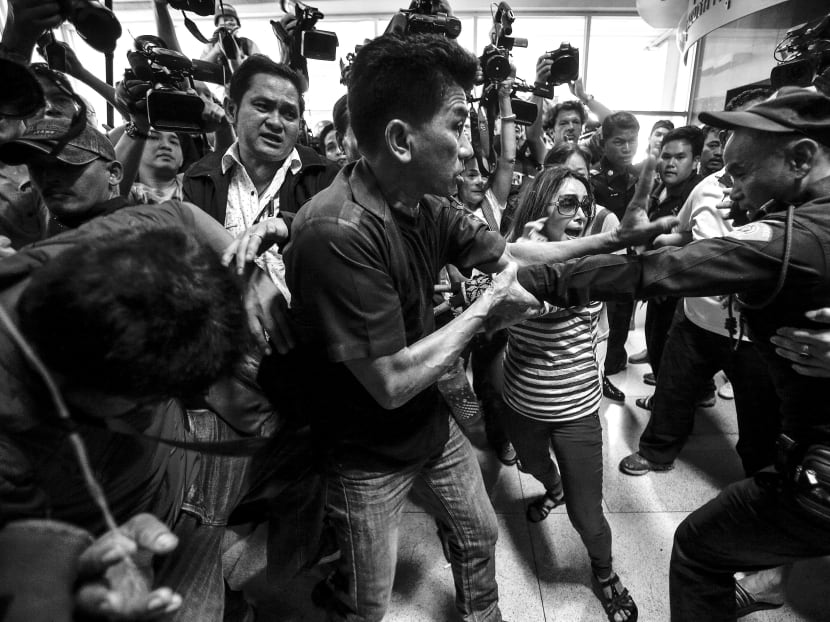The real reason Thais won’t find resolution soon
Thailand’s political future has remained grimly uncertain following last Sunday’s disrupted election.

Protesters demanding the right to vote confronting an officer at the Din Dang district office, where voting was called off, in Bangkok last Sunday. The protests are likely to continue with the aim of creating an ungovernable situation that would invite intervention from either the judiciary or the military.
Photo: REUTERS
Thailand’s political future has remained grimly uncertain following last Sunday’s disrupted election.
Anti-government protesters, led by former opposition Democrat Party Member of Parliament Suthep Thaugsuban, blocked and shut down a number of polling stations. The eve of the polls saw protesters and pro-election groups exchanging gunfire, making it the bloodiest election Thailand has ever witnessed.
Owing to the disruption of the vote, Ms Yingluck Shinawatra could be a caretaker prime minister for months. A series of by-elections will be organised and votes recounted. But the delay of the result will put her government in limbo, deepening the prospect of intensified protests.
It is likely that the protests will continue, with the aim of creating an ungovernable situation that would invite intervention from either the judiciary or the military.
APPEARANCES
On the surface, the Thai crisis is depicted simplistically as Bangkok’s frustration with the so-called ‘Thaksin regime’, which is accused of having tainted Thailand with deep-rooted corruption.
Ms Yingluck’s elder brother was overthrown as Prime Minister in a coup in 2006 because his government allegedly nurtured corruption and displayed disrespect for the monarchy. But this failed to eliminate him from Thai politics, giving birth to the red-shirt movement and its hard-core support of the Thaksin political clan.
When Ms Yingluck’s Pheu Thai party won a landslide election in 2011, Thaksin’s increasingly-insecure enemies sought to destroy the legitimacy of her and her government. The proposed Amnesty Bill last year gave them the opportunity.
However, their discourse of fighting corruption — which has become the protestors’ key source of legitimacy — has conveniently obscured the question of whether Thaksin represented the worst kind of corrupt politician in the country’s history.
Indeed, recent studies show that the Democrats are not a corruption-free political party either. For example, Mr Suthep has been embroiled in numerous corruption cases over the years.
Why is it imperative to discuss this point? It is to underline that obsessively focusing on Thaksin and his corrupt practices could mislead one as to the real cause of the Thai crisis.
DEEPER DISTURBANCES
A closer scrutiny suggests that the inability to compete in the game of electoral politics could have driven the Democrat Party to try to bring down the Yingluck government.
The last time the party won a national majority was in 1992. Meanwhile, Thaksin and his political proxies have won every election since 2001, and possibly may have won again in last Sunday’s poll.
The Democrats have also often looked for shortcuts to power. Take the example of the back-room deal brokered by the military that resulted in the party being able to form a minority government in late 2008.
Members of the old power — ranging from the army and the palace to powerful businesses and senior bureaucrats — have to various degrees supported the Democrat Party and the anti-government protests because they want to defend their own power interests.
Thaksin has long represented a threat to their political, economic and social status. His strategy of taking control of electoral politics has effectively narrowed a political space once enjoyed by the old power.
A sense of anxiety among members of the old power, particularly when looking ahead to the post-King Bhumibol Adulyadej era, is the main driving force behind today’s protests. To them, the future is cloudy; they fear the royal succession could pave the way for Thaksin to entrench his influence in politics. The only way ahead, they believe, is to deracinate Thaksin and Yingluck now once and for all.
Such anxiety suggests that the chances for Thailand to find a peaceful way out of the crisis are slim.
CRISIS WILL DRAG ON
What is next for Thailand? In the short term, Thaksin’s enemies may strive to ensure that the unstable political situation is maintained. Already, the Democrat Party has pledged to lodge complaints with the Election Commission about irregularities, hoping for the Constitutional Court to intervene and nullify the election.
In the worst case, if there is evidence that suggests electoral fraud on the part of the ruling Pheu Thai, the Constitutional Court could order the dissolution of the party, as it did in 2008 with Thaksin’s People’s Power Party.
Meanwhile, politicised agencies such as the Anti-Corruption Commission could become an important instrument in undermining the caretaker government. It has investigated the rice-pledging scheme, which was accused of being rife with corruption.
Even if the Election Commission is able to organise balloting in enough of the outstanding constituencies to ensure a quorum in parliament, and if Ms Yingluck is re-elected prime minister, there is no guarantee that her government will survive the current crisis.
Anti-government forces could incite further violence to the point of total loss of control, in the hopes of a military coup. Should this be the case, a newly-appointed government would be installed despite its lack of legitimacy and legal weight.
As the anxiety over the royal succession is a real determinant behind the political turmoil, Thais should acknowledge that the crisis will not fade away anytime soon. It could take years before leaders of all sides of political divide agree on a new political consensus.
This will also depend on how the new monarch will come to reshape Thailand’s political landscape. It could help end long years of political trouble — or further exacerbate it.
ABOUT THE AUTHOR:
Pavin Chachavalpongpun is Associate Fellow at the Institute of Southeast Asian Studies, Singapore, and Associate Professor with the Centre for Southeast Asian Studies at Kyoto University.






